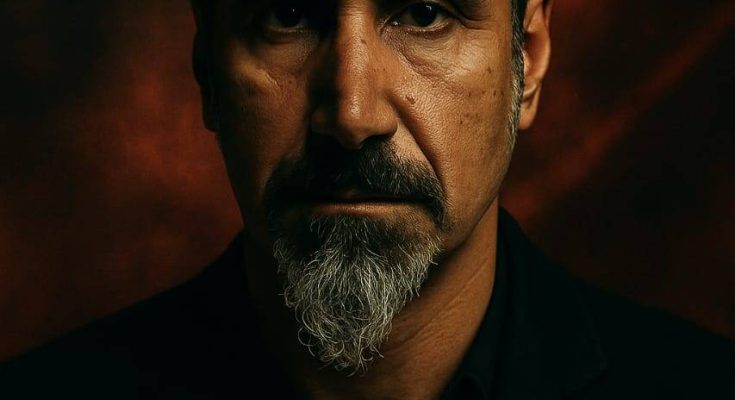The announcement that Netflix has released the trailer for the highly anticipated System of a Down documentary has sent shockwaves through both the metal community and the wider music industry. For decades, the band has been regarded not just as one of the most innovative forces in heavy music, but also as one of the most politically outspoken groups of their era. Their sound, their stage presence, their controversial lyrical themes, and their uncompromising stance on human rights and political issues have given them a place in music history unlike any other. Now, for the first time, a mainstream global platform like Netflix is preparing to tell their story in a documentary that promises to go beyond the music and dig deep into the history, the controversies, the struggles, and the triumphs that have defined System of a Down. With the trailer finally unveiled, anticipation has reached fever pitch as fans, critics, and newcomers alike prepare to witness a cinematic journey into the heart of one of rock’s most unique bands.
The trailer itself is a tightly crafted piece of filmmaking, offering glimpses into the band’s formation in Los Angeles in the mid-1990s, their meteoric rise to fame with a style of metal that fused elements of thrash, alternative, Armenian folk, and punk, and the complex political and cultural issues that became central to their identity. Opening with archival footage of the band’s earliest live performances in dingy Los Angeles clubs, the teaser immediately immerses viewers in the raw, unfiltered energy that made them a local phenomenon long before they became international icons. Quick cuts reveal the intensity of their early fans, their first small-scale tours, and their struggle to break into an American music scene that was dominated at the time by nu-metal and post-grunge.
One of the standout features of the trailer is the way it foregrounds the unique personalities of the band’s members. Frontman Serj Tankian, guitarist and secondary vocalist Daron Malakian, bassist Shavo Odadjian, and drummer John Dolmayan each appear in interview snippets, giving fans a taste of the candid reflections that the full documentary promises to deliver. Tankian, always the philosopher and activist, speaks about the challenges of balancing music with his commitment to human rights causes. Malakian, the band’s main songwriter, offers insights into the creative tensions that fueled their art but also contributed to long periods of inactivity. Dolmayan and Odadjian, too, reflect on the band’s shared Armenian heritage, their deep cultural connections, and the ways those roots influenced both their music and their politics.
But what truly sets this documentary apart, judging from the trailer, is its emphasis on the band’s activism. System of a Down was never just about music. From their earliest days, they were a band with a mission: to use their platform to raise awareness about issues often ignored or silenced. The Armenian Genocide, a historical atrocity that remains a contentious political subject to this day, became a central theme in their message. The trailer shows clips of the band speaking at rallies, engaging with political leaders, and performing at benefit concerts, highlighting their role not just as entertainers but as cultural ambassadors for truth and justice. Netflix appears to have invested heavily in framing the band’s story as one of cultural resilience and political defiance, and that alone has elevated anticipation for the documentary far beyond typical band-focused films.
The music, of course, is at the center of everything. The trailer intercuts intimate interviews with thunderous live performance footage, reminding viewers why System of a Down became one of the biggest bands of their generation. Clips of iconic songs like “Chop Suey!,” “Toxicity,” “B.Y.O.B.,” and “Aerials” explode across the screen, not just as reminders of the band’s artistry but as soundtracks to pivotal cultural moments. Each of these songs became anthems, not just for metal fans, but for young people grappling with the chaos of the early 2000s—a time defined by war, terrorism, and political unrest. The trailer positions these tracks not only as hits but as protest songs, cries of rage, confusion, and hope in a world that often seemed unmoored.
What makes this documentary particularly significant is its timing. System of a Down has been largely inactive in terms of new studio albums since 2005, when they released Mezmerize and Hypnotize. Since then, they’ve performed occasional tours and reunited for select shows, but creative differences, particularly between Tankian and Malakian, have prevented the band from producing new material. The trailer hints that the film will explore these tensions in depth. One particularly striking line comes from Tankian, who says, “It’s not that we couldn’t make music—it’s that we couldn’t make peace.” This raw honesty suggests that fans will finally get answers to questions that have lingered for nearly two decades: why one of the most powerful bands of their generation has struggled to sustain itself creatively despite overwhelming global demand.
Visually, the trailer is a feast. Netflix appears to have spared no expense in combining never-before-seen archival footage, stunning concert visuals, and high-definition interviews into a cohesive cinematic experience. There are shots of the band’s early days in Los Angeles, their explosive performances at massive festivals, intimate backstage moments, and emotional reunions. The juxtaposition of chaotic live energy with quiet, personal reflection gives the film a balance that seems designed to appeal not just to die-hard fans but also to casual viewers who may know the band only from a handful of songs.
The cultural importance of the documentary cannot be overstated. System of a Down is not just a band; they are a voice for a generation that grew up in the shadow of global conflict, political corruption, and cultural upheaval. Their willingness to challenge authority, to call out injustice, and to use their art as a form of protest has made them enduring symbols of resistance. In a world that is once again grappling with authoritarianism, censorship, and war, the timing of this documentary feels almost prophetic. The trailer itself underscores this by showing footage of the band’s involvement in recent causes, including their advocacy for recognition of the Armenian Genocide and their support for humanitarian efforts during times of crisis.
Fans online have already begun to react with overwhelming enthusiasm. Social media platforms are flooded with comments from people who grew up listening to System of a Down, expressing gratitude that their story is finally being told in such a comprehensive way. Many have noted that Netflix’s global reach will introduce the band to a new generation of listeners who may not have been alive during their peak years in the early 2000s. For younger fans, the documentary promises to serve as both an introduction to the band’s music and a history lesson in the power of art as a tool for activism.
Critics, too, are paying attention. Early responses from those who have seen the trailer suggest that this documentary could be one of the most impactful music films of the decade. Unlike many band documentaries, which often reduce themselves to fan service and nostalgia, the System of a Down film seems poised to balance reverence with honesty. The fact that the band members themselves are participating so openly—despite their often-public creative conflicts—adds a layer of authenticity that could make the film resonate far beyond the music world.
At its core, the documentary appears to be about more than just System of a Down. It’s about the role of music in shaping culture, about the responsibility of artists to speak truth to power, and about the struggles that come with maintaining integrity in a commercialized industry. The trailer’s closing moments feature Tankian saying, “We were never meant to just entertain. We were meant to awaken.” That line, delivered with quiet conviction, encapsulates the essence of what has always made System of a Down different. They were never content to play it safe, to deliver catchy hooks without substance. They wanted to shake their listeners awake, to confront them with uncomfortable truths, and to inspire them to think critically about the world around them.
As the release date of the documentary approaches, excitement will only continue to build. For fans, it represents not just an opportunity to relive the glory days of their favorite band but also a chance to gain deeper insight into the people behind the music. For critics and scholars, it offers fertile ground for examining the intersection of art, politics, and culture in the early 21st century. And for Netflix, it marks another bold step into the world of music documentaries, a genre that has become increasingly popular in recent years as streaming platforms compete to capture the passion of music fans.
The trailer for the System of a Down documentary has already made it clear that this will not be a sanitized, corporate retelling of a band’s history. It will be messy, emotional, political, and deeply human—just like the band itself. Whether you are a longtime fan who knows every lyric by heart or someone discovering them for the first time, the documentary promises to be an unmissable exploration of one of the most important bands of our time. With its blend of explosive live footage, candid interviews, and a fearless examination of the cultural issues that shaped the band, it is set to be more than just a film about music. It is set to be a film about truth, defiance, and the power of art to change the world.
As anticipation swells, one thing is certain: when the full documentary finally lands on Netflix, it will not just be a streaming event. It will be a cultural moment. A reminder of why System of a Down mattered, why they still matter, and why their legacy will continue to echo long after the final credits roll. For fans around the world, the release of this trailer marks the beginning of a countdown—not just to a film, but to the celebration of a band that refused to be silent in the face of injustice and forever changed the way we think about what music can achieve.



